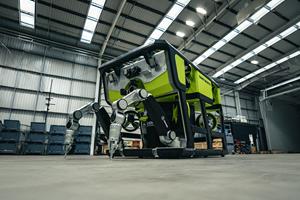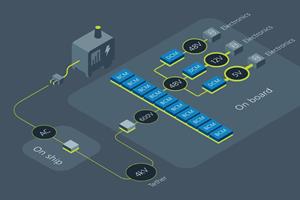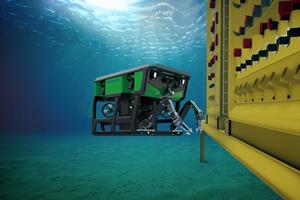Vicor supports Saab UK deep-sea exploration efforts to mitigate risk to divers and the environment
Historically, commercial divers have taken great risks to inspect oil and gas pipelines, high-voltage electrical cables, wind turbines and other critical infrastructure deep undersea. Saab continues to innovate with
With a mission to keep people and society safe, the Seaeye range of ROVs has been developed with more agile and modular systems designs. Saab UK’s Seaeye systems are capable of performing a wide range of tasks from observation and inspection to more complex functions like underwater maintenance.
This evolution has culminated in the world's first work-class all-electric ROV (eWROV), which incorporates Vicor power modules to enable a lightweight, thermally adept power system. Unlike traditional hydraulic ROVs, the eWROV eliminates the need for traditional hydraulic fluid, thereby mitigating environmental risks (Figure 1).
eWROV: all-electric ROV
With a burgeoning ocean economy, Saab’s eWROV competes with traditional hydraulic ROVs, delivering performance equivalent to a 250hp undersea vehicle. The eWROV uses limited hydraulic systems with minimal oil, which reduces the risk of accidentally discharging pollutants into the ocean that can harm the surrounding ecosystem.
The move to electric propulsion required high-density Vicor power modules, which helped to improve reliability and extend service intervals, allowing for longer operating periods and self-monitoring.
Power density: a competitive advantage
The advanced features in Saab’s eWROVs are largely achieved by their exceptionally high-power density, which adds significantly more payload space while outperforming larger hydraulic ROVs. By maintaining a constant subsea voltage level, the DC power system optimizes energy delivery to the ROV's components, reducing overall energy consumption from surface power systems. Consequently, lower energy demands lead to decreased CO2 emissions from surface power generation, making operations more environmentally friendly.
High-density modular power achieves a compact scalable design
Critical specifications for the eWROV’s power converter are size, mass and thermal dissipation, given that the electronic systems are housed in sealed enclosures where space is at a premium and conventional convection cooling is not possible.
To meet these requirements, Saab chose Vicor power modules for their high density and efficiency. These modules enable efficient power distribution to various eWROV subsystems such as thrusters, manipulators and onboard electronics. The use of Vicor power modules allows Saab to customize Seaeye subsystems according to specific industry-standard 24V and 48V levels required by onboard computers, sensors, video cameras, lights and navigation equipment.
The power delivery network (PDN) design focuses on the transmission and conversion of 600V DC power using Vicor fixed-ratio bus converters (BCMs) and regulated DC-DC converters (DCMs) to supply high-performance, low-voltage subsystem power (Figure 2).
The compact power design frees up space within the eWROV, enabling the integration of additional electronics and improving overall performance and data transmission speeds.
Saab has been an innovator since 1937 with a mission to “keep people and society safe.” This next-generation eWROV is the model for the industry, with its high-performance power delivery network design that helps drive more capable ROV designs that can still handle heavy power loads (Figure 3). Saab UK’s innovative hybrid approach to design and operation is further solidifying the company as a global leader in ROV products and services.
Learn more about Saab Seaeye, the world’s most advanced eWROV
About Vicor
Vicor is the leader in high-performance power modules, enabling customer innovation with easy-to-deploy modular power system solutions for power delivery networks that provide the highest density and efficiency from source to point-of-load. We continuously advance the density, efficiency and power delivery capabilities of our power modules by staying on the forefront of distribution architectures, conversion topologies and packaging technology. Vicor serves customers in enterprise and high-performance computing, industrial equipment and automation, robotics, UAVs, electric vehicles and transportation, satellites, and aerospace and defense.
About Saab
Since Saab was started, we have strived to keep people and society safe. It is a basic human need to feel safe and, as we see it, a human right. Through systems and solutions that increase security, we can make this possible.
When Saab was founded in 1937, our primary aim was to provide military aircraft for
For further information:
Vicor
978 749-8243
sgermino@vicr.com
Photos accompanying this announcement are available at
https://www.globenewswire.com/NewsRoom/AttachmentNg/ee24fdc5-13f2-462a-8f3f-2d6c5d1a18e2
https://www.globenewswire.com/NewsRoom/AttachmentNg/5883d793-4eb3-4633-b500-2de059fd2bca
https://www.globenewswire.com/NewsRoom/AttachmentNg/1dd9c95c-cb02-4b0a-9092-a6b7b9a46d58

Figure 1 eWROV
Figure 1 With Vicor’s help, Saab has developed the world's most advanced work-class all-electric ROV (eWROV), which combines versatility and maneuverability. Unlike traditional hydraulic ROVs, the eWROV all-electric system eliminates the need for large amounts of hydraulic fluid, thereby mitigating environmental risks.
Figure 2 PDN
Figure 2 The power delivery network (PDN) design focuses on the transmission and conversion of 600V DC power using Vicor fixed ratio bus converters (BCMs) and regulated DC-DC converters (DCMs) to supply high-performance, low-voltage power delivery. The wide selection of Vicor thermally-adept power modules allows Saab to customize the PDN subsystems according to industry standard 24V and 48V supply voltage levels required by onboard computers, sensors, video cameras, lights and navigation equipment
Figure 3 eWROV (2)
Figure 3 A more efficient and environmentally-friendly system makes the eWROV the world’s most capable and intelligent all-electric, work-class underwater vehicle. Vicor power converters enabled Saab to design a smaller, lightweight power system by efficiently converting high-voltage power down to loads.
Source: Vicor Corporation



